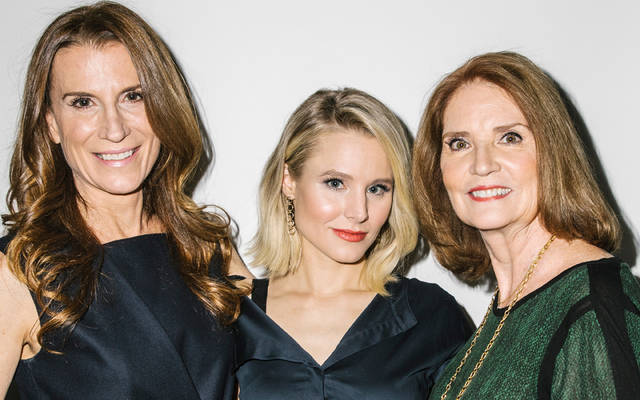At Screen Actors Guild Awards, women will come first

Ask the producers and hosts of coming movie awards shows how or if they’ll be addressing the #MeToo moment, and the responses are a grab bag of no comments, dunnos, TBDs and not sures.
Ask the executive producer of the Screen Actors Guild Awards, or the Turner Broadcasting president responsible for the show, and they reply that yes, indeed, things will be different at their gala on Jan. 21: All 13 of their acting awards will be presented by women, as will be the two stunt awards, which will be handed out beforehand. (The show is to be broadcast on TNT and TBS.) The nominations, which were revealed today, were also announced by women, Olivia Munn and Niecy Nash, and the awards will have a host, their first: Kristen Bell.
“Culturally there’s always been a conversation about equality,” said Bell, chatting Tuesday by phone. “Now there’s some mega-spotlights on this conversation and, dare I say, some pyrotechnics in the background.”
“I’m not the first female host,” she added. “I’m the first host. The fact that a female was chosen to be the first one means my genitals become irrelevant.”
The woman behind the plan to have women present all (or most) of the awards was Kathy Connell, the executive producer. She has overseen the ceremonies since the inaugural show in 1995, and said the thought came to her after she went to the Women’s March in Washington with her daughter and some friends in January. The idea gained new urgency, she said, as accusations of sexual misconduct by powerful men in the entertainment industry began bursting forth.
“I feel pretty strongly about the women’s movement,” Connell said. “Women stepped forward in such a huge way in this last year.”
Don't miss out on what's happening!
Stay in touch with breaking news, as it happens, conveniently in your email inbox. It's FREE!
She went on to say, “I want to salute women who are coming forward to speak at a very difficult time about very difficult subjects at great risk to themselves.”
Sometime in the fall, she took her proposal to Sandra Dewey, a president at Turner who oversees the network’s interest in the show. Dewey said that in the last three years, the network has hired about 400 women as directors, writers, showrunners and set designers, among other positions, in an effort to rebalance an industry overwhelmingly dominated by men. In the summer, the network also began holding informal “Feminist Friday” events so women could discuss obstacles they were facing in their careers, and propose solutions.
Turner jumped at Connell’s idea, Dewey said. “For so many years there’s been so much ground to cover in terms of trying to have women statistically catch up,” she said.
The SAG Awards are a bellwether stop on the way to the Academy Awards. With 160,000 members, and Gabrielle Carteris as its president, SAG-Aftra is the biggest union in Hollywood, and its awards have special resonance for actors because of the unmatched size of the voting pool — Connell said 120,000 members are eligible to cast ballots — and the fact that the prizes come from peers.
Also, every year since 1996, eventual best-picture Oscar winners have either won or been nominated for the all-important SAG Award for top performance by a cast. Sasha Stone of the Awards Daily website, one of the very few Oscar experts who forecast that “Moonlight” would win the Academy Award for best picture, has said the fact that “La La Land” did not land a SAG nomination for outstanding cast performance was an early clue that it wasn’t a runaway favorite, as most prognosticators had assumed.
Last January’s SAG Awards also turned out to be one of the most politically charged and scrappy shows of the season. It was held two days after President Donald Trump’s Muslim travel ban unleashed chaos and spurred protests at major airports, and SAG winners lent their voices to the outcry.
Julia Louis-Dreyfus (“Veep”), whose father fled Nazi-occupied France, called the ban “un-American” and “a blemish.” Mahershala Ali (“Moonlight”) identified himself as a Muslim, to cheers, and urged people to cherish differences rather than war over them. David Harbour of “Stranger Things” vowed to “repel bullies,” “shelter freaks and outcasts” and “hunt monsters,” as audience members jumped up and roared their approval. (Standing alongside him, his castmate Winona Ryder delivered her own awards-worthy reaction to his remarks.)
There will be at least one exception to the all-female roster at the ceremony in January: The award for outstanding performance by a cast will be introduced by men and women, though the award itself will be presented by women (SAG awards are customarily presented by a man and a woman). The names of the presenters, including the person who will hand out the Life Achievement Award, which is going to Morgan Freeman, have yet to be announced.
The show’s changeup comes as the entertainment industry — among many others — grapples with unfolding sexual misconduct allegations that seem to know no end, with prominent figures including Harvey Weinstein, Kevin Spacey, Louis C.K. and Danny Masterson accused of misdeeds ranging from harassment to rape.
Until this season, Weinstein was a ringleader and fixture on the Oscars circuit, but despite his downfall, and what has followed, there has been scant mention of the accusations at early awards shows.
It is also unclear how or if the coming ceremonies will handle the issue, admittedly a particularly tricky one to address sensitively. Bell said she was still deciding whether to bring up the subject in her opening monologue, and wonders what would be accomplished if she did.
“An awards show is not as serious as the conversation deserves to be,” Bell said. “And this night will celebrate women more than any other SAG Awards has, and possibly more than any other awards show has.”
© 2017 The New York Times Company



